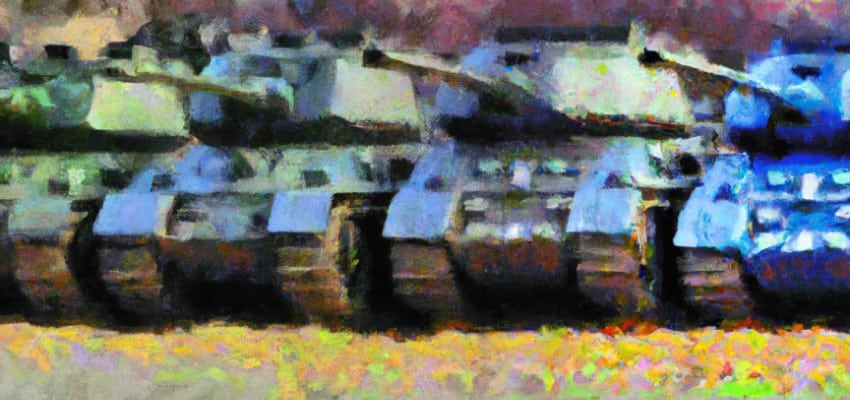|
|
Content Assessment: Doubling Down? Russo-Ukrainian War Update (March 21 - 27, 2023)
Information - 93%
Insight - 94%
Relevance - 95%
Objectivity - 94%
Authority - 94%
94%
Excellent
A short percentage-based assessment of the qualitative benefit of the post highlighting the recent Ukraine conflict assessments in maps from the Institute for the Study of War.
Editor’s Note: The discipline of eDiscovery, which involves the identification, preservation, and analysis of electronic data, is increasingly being used in investigations and litigation relating to war crimes. In the case of the Russo-Ukrainian War, eDiscovery tools and techniques can be used to identify and collect electronic evidence of war crimes, such as emails, social media posts, and other digital communications that may provide valuable insights into the actions of individuals and organizations involved in the conflict. This evidence can then be used in investigations and legal proceedings to hold perpetrators of war crimes accountable for their actions. Additionally, eDiscovery can help to efficiently and effectively manage the vast amount of electronic evidence that may be relevant to war crimes cases, allowing investigators and legal teams to quickly and accurately analyze the data to identify key pieces of information. This weekly update may be useful for cybersecurity, information governance, and legal discovery professionals as they consider investigations and litigation resulting from war crimes committed during the war.
Background Note: One of the most accurate and detailed sources for ongoing updates on the Ukraine crisis is the Russian Offensive Campaign Assessment from the Institute for the Study of War. The Institute for the Study of War (ISW) is a 501(c)(3) organization and produces strictly non-partisan, non-ideological, fact-based research. ISW seeks to promote an informed understanding of war and military affairs through comprehensive, independent, and accessible open-source research and analysis. ISW’s research is made available to the general public, military practitioners, policymakers, and media members. Providing a daily synthesis of key events related to the Russian aggression against Ukraine, ISW updates may benefit investigators and litigators as they follow the business, information technology, and legal trends and trajectories impacted by and stemming from the current Russo-Ukrainian conflict.
Assessment and Maps*
Russo-Ukrainian Conflict Assessments – An Overview in Maps
- Institute for the Study of War (ISW), Russia Team
- Critical Threats Project (CTP), American Enterprise Institute
General Assessment Background Info
- ISW systematically publishes Russian campaign assessments that include maps highlighting the assessed control of terrain in Ukraine and main Russian maneuver axes.
- These maps augment daily synthetic products that cover key events related to renewed Russian aggression against Ukraine.
The Russian Offensive Campaign Assessments
- March 27, 2023
- By Grace Mappes, Karolina Hird, Layne Philipson, and Frederick W. Kagan
Key Development
- Rumors about the dismissal of Russian Eastern Group of Forces (Eastern Military District) Commander Colonel General Rustam Muradov on March 27 generated a muted and cynical response in the Russian information space.
Key Takeaways
- Rumors about the dismissal of Russian Eastern Group of Forces (Eastern Military District) Commander Colonel General Rustam Muradov on March 27 generated a muted and cynical response in the Russian information space.
- Russian milbloggers also had a muted response to Russian President Vladimir Putin’s March 25 announcement to deploy tactical nukes to Belarus, underscoring that Putin’s messaging is aimed at Western rather than domestic Russian audiences.
- Russian military leadership likely committed limited higher quality Wagner Group elements to the offensive on Avdiivka, potentially to reinforce recent limited tactical successes in the area.
- Russian forces made marginal gains around Svatove and Russian forces continue ground attacks along the Kupyansk-Svatove-Kreminna line.
- Russian forces continued ground attacks in and around Bakhmut and made gains within Bakhmut.
- Russian forces continued ground attacks along the Avdiivka-Donetsk City line.
- Russia appears to be increasingly deploying elements of conventional formations in a piecemeal fashion along the entire frontline, including in southern Ukraine.
- Russian authorities continue forming new volunteer battalions subordinate to irregular formations.
- Ukrainian partisans conducted an improvised explosive device (IED) attack against an occupation law enforcement officer in Mariupol, Donetsk Oblast.
- March 26, 2023
- By Frederick W. Kagan
Key Development
- The outcomes of wars often are, in fact, determined on the battlefield with negotiations that merely ratify military realities. Putin likely has one such example vividly in his mind—World War II in Europe. That war ended only when Allied forces had completely defeated the German military and Soviet troops stood in the wreckage of Berlin. Japan surrendered a few months later after the US had demonstrated what appeared to be the ability to destroy the country completely—and only after the Japanese military had lost the ability to do more than impose casualties on the US in the process of losing. Going further back in history the peaces that ended the three Wars of German Unification, the American Civil War, and the Napoleonic Wars also merely ratified realities created by decisive military victories. Even the most recently ended war adhered to this pattern. The US withdrawal from Afghanistan was followed by a decisive Taliban military victory that has ended that conflict (for now) without any formal treaty or accord ratifying this outcome. History offers many counter-examples, to be sure, including the Dayton Accords that ended the Bosnian conflict and the resolution of the 1973 Arab-Israeli War. But it is simply not the case that all wars end in negotiated settlements, particularly if by “negotiated settlements” is meant mutual recognition of the impossibility of achieving desired aims through military force.
Key Takeaways
- Putin initiated the current war and is the key actor who must decide that he cannot achieve his aims by military power and must instead engage in a negotiated resolution of the conflict if the war is to end in this fashion.
- Putin continues to make clear by word and deed that he has come to no such conclusion yet despite the failures of his major military efforts this winter. This would be an appropriate moment for Putin to conclude that Russia cannot impose its will on Ukraine by force and that he must seek a compromise settlement. He has clearly come to no such conclusion, however.
- Putin is instead doubling down on his commitment to overpower Ukraine militarily and/or protract the war by mobilizing Russia’s defense industrial base and renewing various crypto-mobilization schemes to generate renewed combat power.
- The continuing of Russian offensive operations around Bakhmut and Avdiivka, as well as along the Luhansk and western Donetsk front lines, is a further indicator that Putin remains committed to victory in a protracted war whose outcome is determined in large part by military realities on the ground.
- Putin’s continuation of these Russian offensive operations in the current operational and strategic context amounts to strategic malfeasance.
- Putin’s stubbornness in clinging to these offensive operations could make sense, however, in a protracted conflict during which Western support for Ukraine wanes or ends. Putin might even mean these operations to set conditions for a negotiated settlement on terms he has already articulated that include international recognition of Russia’s annexation of all of Donetsk, Luhansk, Zaporizhia, and Kherson oblasts; Ukrainian “neutrality;” the “de-militarization” of Ukraine; and the “de-Nazification” of the Ukrainian government.
- A successful series of Ukrainian counter-offensives, not just one, is thus almost certainly necessary but not sufficient to persuade Putin to enter negotiations on terms other than the achievement of all of his stated objectives. Multiple major Ukrainian operational-level victories are therefore likely essential to creating any prospect of a negotiated settlement of the current conflict or forcing Putin to accept unfavorable military realities absent a formal settlement.
- There is reason to expect that Ukrainian forces can, in fact, make gains through counter-offensives.
- It is far from clear that Putin ever will accept these military realities, however. He may resolve to continue fighting, with or without a pause, as long as it takes to achieve all his aims. His rhetoric and actions, as well as his past patterns, certainly suggest this possibility. A negotiated settlement may therefore be unattainable because Putin will not accept the reality that he cannot actually conquer Ukraine.
- March 25, 2023
- By Angela Howard, Kateryna Stepanenko, Grace Mappes, Nicole Wolkov, and Frederick W. Kagan
Key Development
- Russian President Vladimir Putin launched the predictable next information operation to discourage Ukrainian resistance and disrupt Western support for Ukraine as Russian offensives culminate and Ukraine prepares to launch counter-offensives in an interview with a state-owned Russian news channel on March 25.
Key Takeaways
- Russian President Vladimir Putin launched the predictable next information operation to discourage Ukrainian resistance and disrupt Western support for Ukraine as Russian offensives culminate and Ukraine prepares to launch counter-offensives in an interview with a state-owned Russian news channel on March 25.
- Putin pushed the false narrative that the West cannot sustain weapons provision to Ukraine due to limited Western production and hyperbolized Russia’s potential to mobilize its own defense industrial base (DIB).
- Putin advanced another information operation by announcing that Russia will deploy tactical nuclear weapons to Belarus by July 1 and renewed tired information operations about the potential for nuclear escalation.
- Russian conventional forces may intervene in Wagner Group’s offensive around Bakhmut to prevent the offensive from culminating prematurely.
- Russian forces do not have the degree of fire control over Ukrainian ground lines of communication (GLOCs) to Bakhmut, Avdiivka, and likely other areas of the front that Russian milbloggers claim.
- Russian forces conducted limited attacks along the Kupyansk-Svatove-Kreminna line.
- Russian forces continued to conduct ground attacks in and around Bakhmut and gained limited ground in the city.
- Russian forces reportedly conducted a mass rotation of forces in Nova Kakhovka on the east (left) bank of the Dnipro River.
- Wagner Group financier Yevgeny Prigozhin accused Russian authorities on March 25 of rewriting history to cut out Wagner by forcing state-controlled media outlet RT to cut some coverage of the Wagner Group.
- The Ukrainian Resistance Center reported on March 24 that Moscow elites are competing for funding to “restore” occupied territories and really plan to use the projects to further their own interests.
- March 24, 2023
- By Karolina Hird, Grace Mappes, Angela Howard, Nicole Wolkov, George Barros, and Frederick W. Kagan
Key Development
- Prominent voices in the Russian information space are increasingly setting information conditions to prepare for a potential Ukrainian counteroffensive.
Key Takeaways
- Prominent voices in the Russian information space are increasingly setting information conditions to prepare for a potential Ukrainian counteroffensive.
- Crimean occupation head Sergey Aksyonov has reportedly formed a Wagner Group-affiliated private military company (PMC) in occupied Crimea.
- Some prominent Russian milbloggers criticized the Russian military command for continuing to impale Russian forces on Vuhledar with ineffective human-wave style frontal assaults.
- Russian President Vladimir Putin held a meeting with the Russian Security Council likely as part of his effort to portray himself as a present and effective wartime leader.
- Russian forces conducted limited attacks along the Kupyansk-Svatove-Kreminna line.
- Russian forces have made gains in and around Bakhmut and conducted ground attacks in the Avdiivka-Donetsk City area.
- The Ukrainian General Staff corrected its March 23 statement that Russian forces withdrew from Nova Kakhovka, occupied Kherson Oblast.
- Russian occupation authorities announced the creation of a pro-Russian militaristic youth movement aimed at brainwashing children.
- The Russian government is adopting new measures to revitalize and eliminate corruption, lethargy, and resistance in Russia’s defense industrial base (DIB).
- The United Kingdom Ministry of Defense (UK MoD) reported on March 24 that at least 1,000 Russian personnel training at the 230th Combined Arms Obuz-Lesnovsky Training Ground in Brest, Belarus, redeployed to Russia.
- March 23, 2023
- By Kateryna Stepanenko, George Barros, Grace Mappes, Nicole Wolkov and Frederick W. Kagan
Key Development
- Wagner Group financier Yevgeny Prigozhin has softened his rhetoric towards the Russian Ministry of Defense (MoD) likely out of fear of completely losing his mercenary force in Bakhmut.
Key Takeaways
- Wagner Group financier Yevgeny Prigozhin has softened his rhetoric towards the Russian Ministry of Defense (MoD) likely out of fear of completely losing his mercenary force in Bakhmut.
- Prigozhin denied the Kremlin’s claims that Russia is fighting NATO in Ukraine and questioned whether there are actually Nazis in Ukraine as the Kremlin constantly claims.
- Bloomberg reported that Prigozhin is preparing to scale back Wagner’s operations in Ukraine after Russian military leadership succeeded in cutting key supplies of personnel and munitions.
- Ukrainian officials supported ISW’s prior assessments that Russian forces are unable to conduct large-scale, simultaneous offensive campaigns on multiple axes.
- Russian forces may be shifting their missile strike tactics to focus on Ukrainian military facilities as overall Russian missile strikes decrease, indicating the depletion of Russia’s stocks of high-precision missiles.
- Russian Prime Minister Mikhail Mishustin outlined various measures to support Russian military personnel, the Russian defense industrial base (DIB), and Russian independence from the West in an address to the State Duma.
- The International Atomic Energy Agency (IAEA) reported that Rosatom may be working to restore three power lines at the Zaporizhzhia Nuclear Power Plant (ZNPP) which would increase Russian control over the ZNPP.
- Russian forces conducted limited ground attacks northeast of Kupyansk and along the Svatove-Kreminna line.
- Russian forces are continuing to attack Bakhmut City and areas in its vicinity and around Avdiivka.
- Ukrainian forces continue to conduct raids over the Dnipro River in Kherson Oblast.
- The Kremlin continues efforts to coerce Russian reservists, conscripts, and other personnel into contract service.
- Russian Prime Minister Mikhail Mishustin announced that Russia is continuing efforts to integrate newly-occupied Ukraine into Russian institutions and infrastructure.
- Russian forces in Belarus recently redeployed back to Russia ahead of Russia’s spring conscription call-up on April 1.
- March 22, 2023
- By Riley Bailey, George Barros, Grace Mappes, Kateryna Stepanenko, Nicole Wolkov, Layne Philipson, and Frederick W. Kagan
Key Development
- Russian Defense Minister Sergey Shoigu walked away and refused to answer a question about how soon to expect peace in Ukraine.
Key Takeaways
- Russian forces conducted a limited drone and missile strike campaign in Ukraine overnight on March 21-22, indicating that Russian forces continue struggling with precision missile shortages.
- Russian Defense Minister Sergey Shoigu announced that the Russian Ministry of Defense (MoD) intends to increase the size of Russia’s air defense forces at a Russian Ministry of Defense (MoD) collegium on March 22.
- Shoigu likely signaled to Japan that it should not become more engaged in supporting Ukraine by announcing the deployment of an anti-shipping missile system on one of the Kuril Islands.
- Russian Defense Minister Sergey Shoigu walked away and refused to answer a question about how soon to expect peace in Ukraine.
- The tempo of Russian operations around Bakhmut appears to be slowing amid Western reporting that Russian forces may be attempting to launch offensives in other directions.
- Russian forces may be deploying T-54/55 tanks from storage to Ukraine to compensate for significant armored vehicle losses.
- Russian forces conducted limited ground attacks along the Svatove-Kreminna line.
- Russian forces made marginal territorial gains within Bakhmut and continued offensive operations in and around Bakhmut and on the outskirts of Donetsk City.
- Ukrainian officials stated that Ukrainian forces continue to clear an area on the east (left) bank of the Dnipro River.
- The Kremlin continued hybrid reserve callup and crypto mobilization campaigns to recruit Russians for contract service.
- Russian officials and occupation authorities continued to advocate for legislative changes in an effort to further legitimize the deportation of Ukrainian children to Russia.
- March 21, 2023
- By Karolina Hird, Kateryna Stepanenko, Riley Bailey, Nicole Wolkov, and Frederick W. Kagan
Key Development
- Russian President Vladimir Putin appears to be setting conditions to weaponize the United Nations Security Council (UNSC) as a method of Russian power projection in advance of Russia’s accession to the rotating UNSC presidency in April.
Key Takeaways
- Russian President Vladimir Putin appears to be setting conditions to weaponize the United Nations Security Council (UNSC) as a method of Russian power projection in advance of Russia’s accession to the rotating UNSC presidency in April.
- The readouts of the second day of Chinese President Xi Jinping’s visit with Russian President Vladimir Putin continued to suggest that Putin has not been able to secure the no-limits bilateral partnership with China that he likely hoped for.
- Putin falsely portrayed the Western provision of depleted uranium ammunition (not suitable for use in nuclear or radiological weapons) to Ukraine as a significant escalation in order to bolster information operations aiming to deter Western security assistance to Ukraine and to place the onus for negotiations on the West.
- Wagner Group may lose most of its convict force in the upcoming weeks as convicts finish their six-month military contracts.
- The Russian Federal Security Service (FSB) and the Russian National Guard (Rosgvardia) launched a criminal investigation into the Deputy Commander of the Rosgvardia’s Central District, Major General Vadim Dragomiretsky.
- The US Department of Defense (DoD) announced that it authorized a presidential drawdown to provide around $350 million of security assistance to Ukraine.
- Russian forces continued limited offensive operations along the Kupyansk-Svatove-Kreminna line.
- Russian forces did not make any confirmed gains in or around Bakhmut and continued offensive operations along the outskirts of Donetsk City.
- The Kremlin continues crypto mobilization campaigns to recruit men across Russia for contract service to avoid declaring a second mobilization wave.
- Russian occupation officials continue to facilitate the deportation of Ukrainian children to Russia.
We do not report in detail on Russian war crimes because those activities are well-covered in Western media and do not directly affect the military operations we are assessing and forecasting. We will continue to evaluate and report on the effects of these criminal activities on the Ukrainian military and population and specifically on combat in Ukrainian urban areas. We utterly condemn these Russian violations of the laws of armed conflict, Geneva Conventions, and humanity even though we do not describe them in these reports.
Chronology of Maps from March 21-27, 2023 – Mouseover to Scroll
Ukraine-Conflict-Maps-032123-032723See the Institute for the Study of War Interactive Map of the Russian Invasion
Read the latest Ukraine Conflict updates from the Institute for the Study of War
* Shared with direct express permission from the Institute for the Study of War (ISW).
About the Institute for the Study of War Research Methodology
ISW’s research methodology relies on both primary and secondary sources, enabling researchers to develop a comprehensive understanding of the situation on the ground. In order to analyze military and political developments in any given area, ISW’s research analysts must wholly understand the systems of enemy and friendly forces. They must also understand the population demographics, physical terrain, politics, and history of that area. This lays the analytical foundation for understanding the reasons for particular developments and fulfilling their assigned research objectives. ISW analysts also spend time in places like Iraq, Afghanistan, and elsewhere in order to gain a better understanding of the security and political situation and to evaluate the implementation of current strategies and policies. Our researchers compile data and analyze trends, producing a granular analysis of developments in areas of research, producing an accurate, high-resolution, timely, and thorough picture of the situation. ISW’s research methodology guarantees its success and commitment to improving the nation’s ability to execute military operations, achieve strategic objectives, and respond to emerging problems that may require the use of American military power.
About the Institute for the Study of War
The Institute for the Study of War advances an informed understanding of military affairs through reliable research, trusted analysis, and innovative education. We are committed to improving the nation’s ability to execute military operations and respond to emerging threats in order to achieve U.S. strategic objectives. ISW is a non-partisan, non-profit, public policy research organization.
Learn more, get involved, and contribute today.
Additional Reading
- From Dissent to OSINT? Understanding, Influencing, and Protecting Roles, Reputation, and Revenue
- [Annual Update] International Cyber Law in Practice: Interactive Toolkit
- Data Embassies: Sovereignty, Security, and Continuity for Nation-States
Source: ComplexDiscovery


























